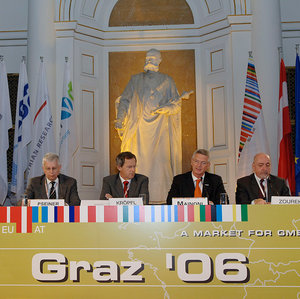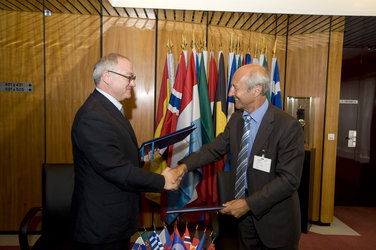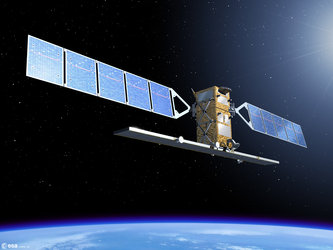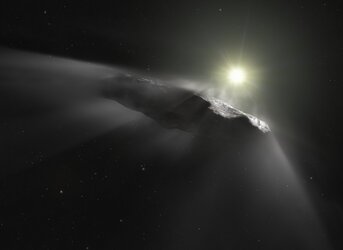Accept all cookies Accept only essential cookies See our Cookie Notice

About ESA
The European Space Agency (ESA) is Europe’s gateway to space. Its mission is to shape the development of Europe’s space capability and ensure that investment in space continues to deliver benefits to the citizens of Europe and the world.
Highlights
ESA - United space in Europe
This is ESA ESA facts Member States & Cooperating States Funding Director General Top management For Member State Delegations European vision European Space Policy ESA & EU Space Councils Responsibility & Sustainability Annual Report Calendar of meetings Corporate newsEstablishments & sites
ESA Headquarters ESA ESTEC ESA ESOC ESA ESRIN ESA EAC ESA ESAC Europe's Spaceport ESA ESEC ESA ECSAT Brussels Office Washington OfficeWorking with ESA
Business with ESA ESA Commercialisation Gateway Law at ESA Careers Cyber resilience at ESA IT at ESA Newsroom Partnerships Merchandising Licence Education Open Space Innovation Platform Integrity and Reporting Administrative Tribunal Health and SafetyMore about ESA
History ESA Historical Archives Exhibitions Publications Art & Culture ESA Merchandise Kids Diversity ESA Brand Centre ESA ChampionsLatest
Space in Member States
Find out more about space activities in our 23 Member States, and understand how ESA works together with their national agencies, institutions and organisations.
Science & Exploration
Exploring our Solar System and unlocking the secrets of the Universe
Go to topicAstronauts
Missions
Juice Euclid Webb Solar Orbiter BepiColombo Gaia ExoMars Cheops Exoplanet missions More missionsActivities
International Space Station Orion service module Gateway Concordia Caves & Pangaea BenefitsLatest
Space Safety
Protecting life and infrastructure on Earth and in orbit
Go to topicAsteroids
Asteroids and Planetary Defence Asteroid danger explained Flyeye telescope: asteroid detection Hera mission: asteroid deflection Near-Earth Object Coordination CentreSpace junk
About space debris Space debris by the numbers Space Environment Report In space refuelling, refurbishing and removingSafety from space
Clean Space ecodesign Zero Debris Technologies Space for Earth Supporting Sustainable DevelopmentLatest
Applications
Using space to benefit citizens and meet future challenges on Earth
Go to topicObserving the Earth
Observing the Earth Future EO Copernicus Meteorology Space for our climate Satellite missionsCommercialisation
ESA Commercialisation Gateway Open Space Innovation Platform Business Incubation ESA Space SolutionsLatest
Enabling & Support
Making space accessible and developing the technologies for the future
Go to topicBuilding missions
Space Engineering and Technology Test centre Laboratories Concurrent Design Facility Preparing for the future Shaping the Future Discovery and Preparation Advanced Concepts TeamSpace transportation
Space Transportation Ariane Vega Space Rider Future space transportation Boost! Europe's Spaceport Launches from Europe's Spaceport from 2012Latest
GMES VNR - Global Monitoring for Environment and Security
This video provides an in-depth look at the Global Monitoring for Environment and Security (GMES) Programme, which has been established to fulfil the growing need amongst European policy-makers to access accurate and timely information services to better manage the environment, understand and mitigate the effects of climate change and ensure civil security. Under the leadership of the European Commission (EC), GMES relies largely on data from satellites and also on in-situ measurements to observe Earth. ESA is providing satellite technology and the EC is responsible for harmonizing and integrating the data, setting requirements and managing the services. Soundbites are provided by: Thomas Fago, Chairman, Helsinki Commission Group, on the dire situation of pollution in the Baltic Sea; Menghestab Haile, Vulnerability Analysis & Mapping Advisor, WFP (UN), on how GMES datasets provide info on which countries are prone to droughts, floods and deforestation, etc., and helps to plan logistics for food aid by providing info on nearest airport landing strips and nearby ports; and Dr Hartmut Grassl, Director at Max Planck Institute for Meteorology, on how GMES also provides data on land subsidence in countries due to activities such as construction, and extraction of natural gas and oil.
-
CREDIT
ESA -
LICENCE
ESA Standard Licence
-
Documentary
-
-
-
Aerial view Aircraft Airplane Antenna Applications from space Cargo Ceremonies and agreements Clean room Climate Change Conference Control room Cooperation Damage Data Deforestation Deserts and desertification Drought Earth Earth views (taken by astronauts) Environment health European Commission Fires Floods Food Forest General public Global change Human Landscape Landslides Marine pollution Max Plank Institute, Germany Navigation for aircraft Navigation for ships Oil spills Public health Remote sensing Rescue Satellite image Satellites Soil erosion Subsidence

The GMES press conference in Graz

GMES status update

ESA and EUMETSAT sign GMES Framework Agreement

ESA and EUMETSAT sign GMES Framework Agreement















 Germany
Germany
 Austria
Austria
 Belgium
Belgium
 Denmark
Denmark
 Spain
Spain
 Estonia
Estonia
 Finland
Finland
 France
France
 Greece
Greece
 Hungary
Hungary
 Ireland
Ireland
 Italy
Italy
 Luxembourg
Luxembourg
 Norway
Norway
 The Netherlands
The Netherlands
 Poland
Poland
 Portugal
Portugal
 Czechia
Czechia
 Romania
Romania
 United Kingdom
United Kingdom
 Slovenia
Slovenia
 Sweden
Sweden
 Switzerland
Switzerland


























